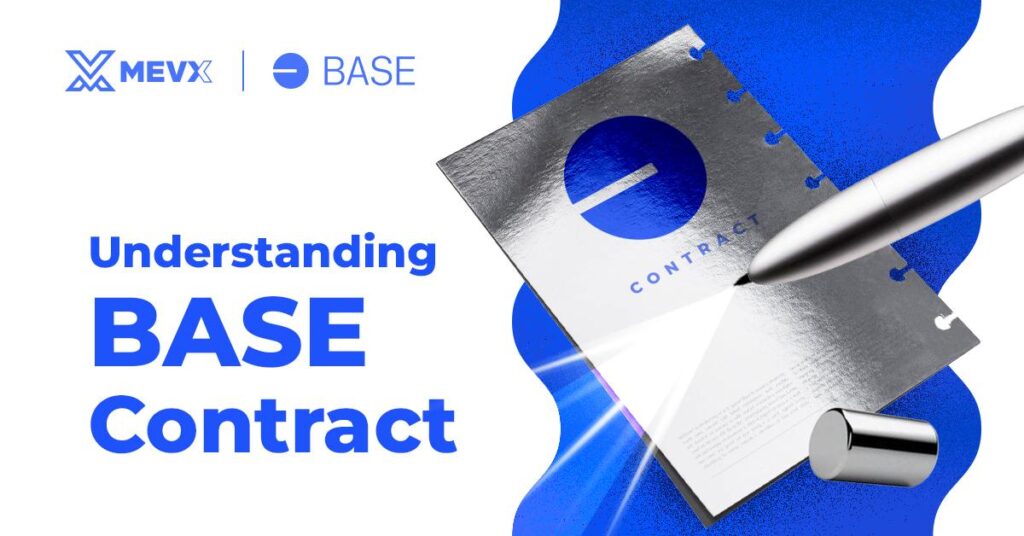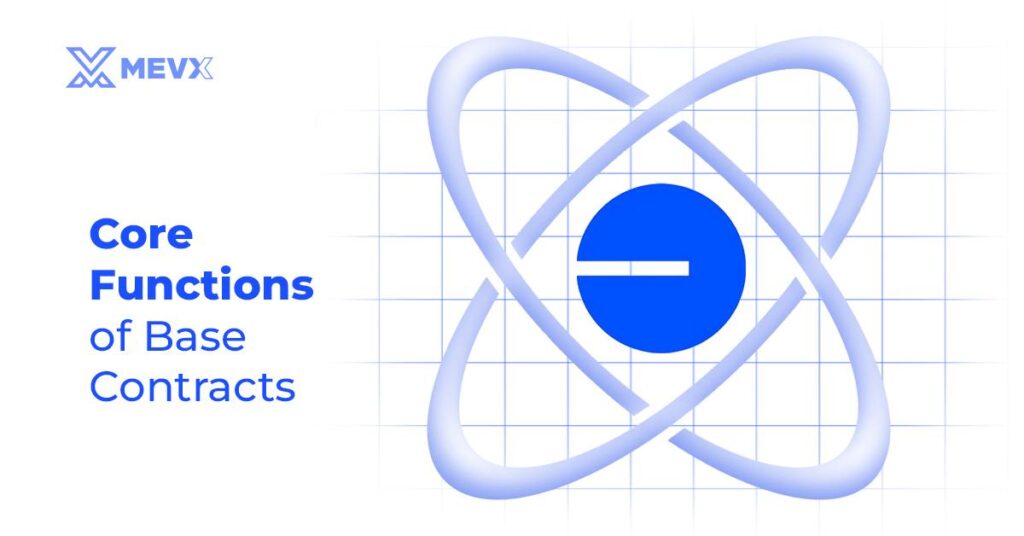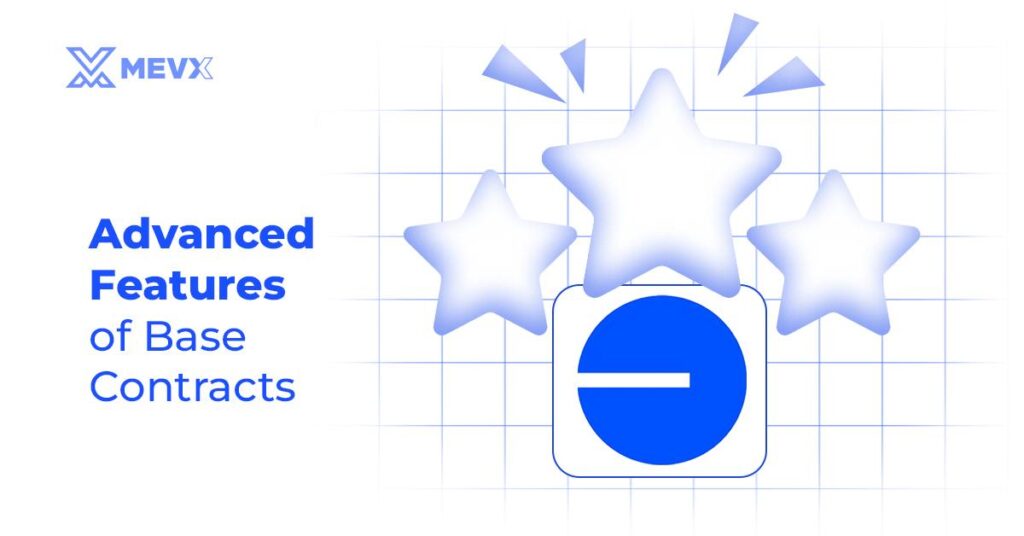The blockchain space is always under development, bringing new and fresh solutions for the developer community, businesses, and investors alike. Base chain is a layer-2 network built by Coinbase on Ethereum. Among the essential components in their operability are Base contracts, which grant the possibility of security, scalability, and efficiency to decentralized applications (dApps).
This article will look deeper into what Base contracts are, their significance, and how they work within the Base ecosystem.

What is Base Contract?
Base contracts or smart contracts which deployed on the Base blockchain, a layer-2 solution built atop Ethereum. These contracts are self-executing agreements with the terms written directly into the code. Leveraging Ethereum’s robust security features and Base’s scalability, contracts facilitate a wide range of activities, from decentralized finance (DeFi) operations to gaming and supply chain management.
How Does Base Contract Work?
Base contracts operate similarly to other smart contracts on the Ethereum blockchain, with a few optimizations tailored for the Base network:
- Deployment: The code for contracts is written by developers, usually in Solidity, the main programming language for Ethereum-compatible blockchains. Once written, the code is compiled and deployed onto the Base network.
- Execution: Base contract automatically implements the actions as set forth upon the occurrence of certain conditions. For example, a contract could transfer tokens, execute trades, or manage access rights on its own.
- Interaction with Ethereum: As a layer-2 solution, Base leverages the security of Ethereum. From time to time, all the transactions and interactions occurring on Base are batched together onto Ethereum to ensure their immutability and transparency.
- Cost Efficiency: Base contracts are designed to bear lower transaction fees with increased throughput compared to fully functioning working directly on Ethereum; this includes a wide use of scaling techniques like Optimistic Rollups.
Core Functions of Base Contracts
Base Contracts offer a broad scope of functionalities integral to the ecosystem’s functioning. Following are the many examples of this.

1. ERC-20 Token Management
Base Contracts support the ERC-20 token standard, enabling:
- Token Transfers: Secure movement of tokens between accounts.
- Allowance Management: permissions given to other users or other applications to spend tokens.
- Token Minting and Burning: enables token creation/minting or burning to reduce supply.
2. Token Bridging Across Networks
A very important feature of Contracts is the ability to bridge tokens across Base and other networks. It includes functions like the following:
- Lock the tokens on the source chain.
- Mint corresponding tokens on the destination chain.
3. Governance Support
Contracts allow for decentralized governance, thus providing functionality for:
- Proposing changes to the ecosystem.
- Voting on those proposals.
- Automatic execution of changes approved.
4. Interoperability
By design, contracts of Base are highly interoperable, enabling:
- Ease of integration with Ethereum-based applications.
- Interoperability with other Layer-2 and Layer-1 networks.
Key Features of Base Contracts
Base contracts offer several features that make them attractive for developers and users, including the following:
1. Security
These contracts inherit Ethereum’s robust security framework, ensuring that transactions are secure and tamper-proof. This makes them reliable for applications involving sensitive data or significant financial transactions.
2. Scalability
The layer-2 architecture of Base means that a high throughput of transactions can be handled with the contracts. Scalability is highly important for applications that need real-time interactions, like gaming or DeFi applications.
3. Interoperability
The contracts of Base will be compatible with Ethereum’s ecosystem. Therefore, seamless integrations with Ethereum-based assets, tools, and services will be made possible. One can easily port existing Ethereum dApps to Base with minimal changes.
4. Programmability
Like all smart contracts, contracts of Base are programmable; therefore, developers can create customized solutions for particular use cases. The possibilities are endless, from complex financial instruments to simple token transfers.
5. Cost-Effectiveness
Since smart contracts on the Base network reduce gas fees, dApps become more affordable for both users and developers.
Advanced Features
Base Contracts include advanced functionalities that enhance their utility and performance.

Optimistic Rollup Integration
Leveraging Optimistic Rollup technology:
- Bundle multiple transactions for cost-efficient processing.
- Use fraud-proof mechanisms to validate transactions.
Smart Contract Deployment
Developers can deploy customized smart contracts through:
- Compatibility with Solidity and other Ethereum tools.
- Ready-to-use templates for tokens, governance, and more.
Event and Data Logging
Contracts efficiently manage blockchain data with:
- Event logging for activity tracking.
- Query tools for accessing historical and live data.
Use Cases for Base Contracts
Base contracts are the building blocks of several applications in diverse fields. Some of the most common use cases include:
1. Decentralized Finance (DeFi)
The base contract enables the creation of DeFi platforms for DEX, lending protocols, and yield farming services. This will automatically carry out financial operations, thereby reducing the involvement of middlemen, and reducing the cost while increasing efficiency.
2. Non-Fungible Tokens (NFTs)
Applications on contracts ensure a successful minting, buying, selling, and trading of digital assets. Artists, musicians, and other creators use this avenue for tokenizing their work and building relationships with the audience.
3. Gaming
In the gaming industry, contracts allow developers to create blockchain-based games where players can own, trade, and monetize in-game assets. These contracts ensure that transactions are secure and assets remain tamper-proof.
4. Supply Chain Management
Base contracts improve supply chain transparency and traceability by automatizing steps in the process and recording them on a blockchain. This helps businesses reduce fraud and inefficiencies while assuring compliance.
5. Identity Verification
These contracts can help individuals have greater control over their digital identities. These contracts allow for secure, decentralized identity management systems that protect user privacy.
6. Crowdfunding
Base can make crowdfunding campaigns more transparent and effective. They ensure funds are released to project creators only when predefined milestones are reached, building trust between creators and contributors.
Challenges and Solutions
While Base contracts offer numerous advantages, developers may face certain challenges:
1. Complexity
Writing secure and efficient smart contracts requires expertise. To address this, developers can use pre-built templates and frameworks, reducing the chances of errors.
2. Scalability Concerns
Although Base is designed for scalability, dApps with extremely high traffic might face occasional delays. Optimizing contract code and leveraging Base’s advanced features can help mitigate these issues.
3. Security Risks
Vulnerabilities in smart contracts can lead to exploits. Regular audits and the use of established libraries can enhance security.
The Future of Base Contracts
The adoption of Base contracts is set to grow as more developers recognize the benefits of building on Base. Future advancements might include:
- Enhanced Interoperability: Seamless integration with other blockchain networks.
- Improved Developer Tools: More robust frameworks and libraries for building and deploying contracts.
- Wider Adoption: Increased use of contracts in industries like healthcare, real estate, and education.
- AI Integration: Combining Base contracts with artificial intelligence to create smarter, more adaptive dApps.
Conclusion
Base contracts are about to revolutionize how dApps will be built and operated in terms of security, scalability, and cost efficiency for blockchain developers. Be it a veteran developer or fresh to blockchain development, mastery of Base Contracts could mean the unlocking of new vistas.
By unleashing Base contracts, solutions will be enabled that upgrade not only user experiences but also blockchain adoptions across different industries. Base contracts have a great future ahead, and the prospects are limitless.
Don’t forget to follow MevX for more cryptocurrency guides and strategies, and stay updated with our latest content!
Share on Social Media:
